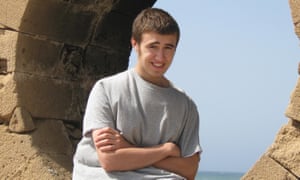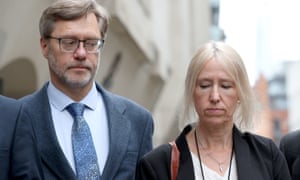Home Office thwarted return home of Isis suspect Jack Letts
Letts was disillusioned in Syria but his case officer was told to ‘back off’ by the government
British Islamic State fighter Jack Letts, whose parents were convicted of funding terrorism, wanted to return to the UK, but the Home Office pulled the plug on attempts to rehabilitate him.
The 23-year-old – known as “Jihadi Jack” – who joined Isis as a teenager, had discussed leaving Syria in 2016 with a counter-radicalisation expert until the UK government took him off the Letts case, the Observer has learned.
On Friday his parents were found guilty of funding terror by sending money to Letts while he was living with Isis in Syria.
The Muslim convert, currently in custody in a Kurdish jail, told his Home Office-appointed counter-terrorism specialist that he was prepared to come home to face the UK authorities.
Hanif Qadir, who worked for the government’s counter-extremism programme Prevent, had a series of Facebook conversations with Letts while he was in Syria.
“He definitely wanted to leave that place. The last conversation we had was how can we get him out of there. The best option was to make his way into Jordan or Turkey and on to a UK embassy, where he would surrender and face the consequences when he got back and also open himself up to rehabilitation. It would have worked.”
Qadir was appointed to the case on approval from the South East Counter Terrorism Command, the Home Office and with the backing of Letts’s parents. He had more than 20 conversations with the Isis recruit between October 2015 and early 2016. The Home Office does not comment on individual cases, but has said it would try to block Isis recruits hoping to return to the UK.
Qadir said that he challenged Letts repeatedly on the theological underpinnings of Isis and that although confrontational initially, he gradually became more open.
In 2017 Letts left Isis after becoming disillusioned with the group, but was captured and is currently in jail in northern Syria. “He wanted to speak to me, that’s the best aspect of an intervention from an expert perspective. His mother was also convinced he was ready to leave,” said Qadir.
On Friday his parents John Letts, 58, an internationally renowned organic grain farmer, and Sally Lane, 57, a former Oxfam fundraiser, were found guilty of one charge of funding terrorism by sending £223 in 2015. They were cleared of sending him a further £1,000 and a verdict could not be reached on a third charge related to an attempt to send £500.
The couple defied police warnings, along with those from Qadir, not to send money to Letts, because of concerns he had joined Isis. His parents, from Oxford, refused to believe that Jack had become an extremist, and sent the money, as they believed he was in danger.
“He was definitely radicalised, the ideology was very much aligned to that of Daesh [Isis] but there was an opportunity for deradicalisation and rehabilitation,” said Qadir.
However, Qadir was taken off the case as part of an approach introduced by Theresa May in the Home Office of disengagement with radicalised individuals. “They just told me to back off and drop everything. It was amazing, because high-risk intervention work was suddenly put on the back burner,” said Qadir.
In an interview with the BBC, Letts said that he would not appeal to the British public to give him a second chance. Letts admitted that he fought for Isis but he did not believe he had killed anyone.
A dual national, Letts also confirmed he had been in contact with Canadian authorities who are understood to be allowing him to leave Syria for Canada.
Since you’re here…
… we have a small favour to ask. More people are reading and supporting The Guardian’s independent, investigative journalism than ever before. And unlike many new organisations, we have chosen an approach that allows us to keep our journalism accessible to all, regardless of where they live or what they can afford. But we need your ongoing support to keep working as we do.
The Guardian will engage with the most critical issues of our time – from the escalating climate catastrophe to widespread inequality to the influence of big tech on our lives. At a time when factual information is a necessity, we believe that each of us, around the world, deserves access to accurate reporting with integrity at its heart.
Our editorial independence means we set our own agenda and voice our own opinions. Guardian journalism is free from commercial and political bias and not influenced by billionaire owners or shareholders. This means we can give a voice to those less heard, explore where others turn away, and rigorously challenge those in power.
We need your support to keep delivering quality journalism, to maintain our openness and to protect our precious independence. Every reader contribution, big or small, is so valuable. Support The Guardian from as little as $1 – and it only takes a minute. Thank you.




0 Commentaires